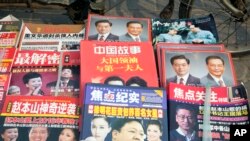A massive data leak from a Panamanian firm has revealed that from relatives of the founding father of the People's Republic of China, Mao Zedong, to current leader Xi Jinping, offshore holdings are common place among the families of China's ruling elite.
Among the more than 11 million documents are details about the offshore holdings of relatives of at least seven current and former Politburo Standing Committee members, a powerful political body in China, and the grandson-in-law of the founding father of the People’s Republic of China, Mao Zedong.
On Wednesday, the International Consortium of Investigative Journalists said that Chinese leaders’ relatives who have offshore holdings include: Deng Jiagui, the brother-in-law of President Xi Jinping; Lee Shing Put, a son-in-law of Standing Committee member Zhang Gaoli; Zeng Qinghuai, a brother of former Chinese Vice President Zeng Qinghong; and Li Xiaolin, the daughter of former Premier Li Peng.
The ICIJ also said its analysis of leaked records indicates that by the end of 2015, Mossack Fonseca – the law firm at the center of the document dump – was collecting fees for more than 16,300 offshore companies from China and Hong Kong, accounting for 29 percent of its business worldwide. Hong Kong is the company’s busiest office in Asia and the world.
Putting money in offshore accounts is not necessarily illegal, and can be used to establish legal tax shelters or ease international business deals. But the report said the documents show banks, law firms and other offshore players often fail to follow legal requirements to make sure their clients are not involved in criminal enterprises, tax dodging or political corruption.
Suspicious switch
The documents confirmed some details already known about financial connections between Gu Kailai, the wife of former rising Chinese political star Bo Xilai, and a French architect. There is also new information. In an article for ICIJ, Alexa Olesen noted data showing that Gu switched the ownership structure of her offshore company just two weeks after she murdered British businessman Neil Heywood.
Both Gu and her husband are now in prison in China.
Massive wealth accumulated by the families of China’s ruling party members has long been a big concern in China, but also a topic on which discussion is tightly controlled.
Much less is known, however, about the ways China's rich and powerful hide their wealth.
China has moved quickly to limit discussion of the Panama Papers online and the foreign ministry has refused to comment on the massive document dump, describing the revelations about links between officials’ relatives and offshore firms as “groundless.”
Even Mao’s relatives
The documents also include information about Chen Dongsheng and a company he incorporated in the British Virgin Islands in 2011. Chen is the husband of Kong Dongmei, a granddaughter of Mao Zedong. The two were married that same year.
The couple were thrust into the spotlight in 2013 when they were included in New Fortune magazine’s rich list, ranking 242nd with an estimated personal wealth of $815 million. In an interview with the Financial Times later that same year, however, Chen said his relationship with Kong had nothing to do with his business success.
Details about the holdings of Hu Dehua, the son of late Communist Party leader Hu Yaobang, were also among the files. According to documents obtained by the ICIJ, the late leader’s son listed his family’s home address in Beijing, where Hu Yaobang lived when he was head of the party, for a company he incorporated in the British Virgin Islands in 2003.
Dollar transaction
One of the youngest family members with offshore holdings unveiled through the leaked documents is Jasmine Li Zidan, the granddaughter of Jia Qinglin, a former Politburo Standing Committee member.
As a freshman at Stanford University in California in 2010, Li became the owner of an offshore company called Harvest Sun Trading Limited. According to the ICIJ, documents show ownership was transferred to Li for one dollar from Zhang Yuping, the founder of Chinese luxury watch distributor Hengdeli Holdings Limited.
Li has two companies registered in the British Virgin Islands: Harvest Sun and Xin Sheng, which are parent companies of two Beijing-registered consulting companies.
More transparency
According to documents, Deng Jiagui, the son-in-law of Xi Jinping, became the sole director and shareholder of one offshore company in 2004 and two more in 2009. The "shelf companies" – corporations that have no activity – were in the Mossack Fonseca inventory. The ICIJ said that by the time Xi Jinping became president in 2013, the companies were dormant.
Since coming to power, Xi has carried out a high-profile campaign against corrupt officials, publicizing some prosecutions in state media as evidence that the Communist Party is serious about punishing graft. However, authorities also have aggressively censored news stories by foreign publications that explore the overseas investments and financial gains by top officials and their relatives.
The Chinese public wants more transparency about the financial dealings of its officials and their families, but it is unlikely that the new revelations will lead to any concrete actions by the government to address the use of offshore holdings.
On a VOA Mandarin call-in talk show Wednesday, a caller surnamed Peng said, "The saddest thing is the attitude taken by the Chinese government. They tried to cover up, to block the news, in order to 'maintain stability.' Their so-called anti-corruption campaigns are fake, because it is institutional corruption. Officials under this system cannot survive without corruption."
A panelist on the program, economist and news commentator He Qinglian, said offshore accounts are not against the law in China.
"China is concerned about whether the source of the money is legal. What is exposed by the Panama Papers is really just the tip of the iceberg," she said.






